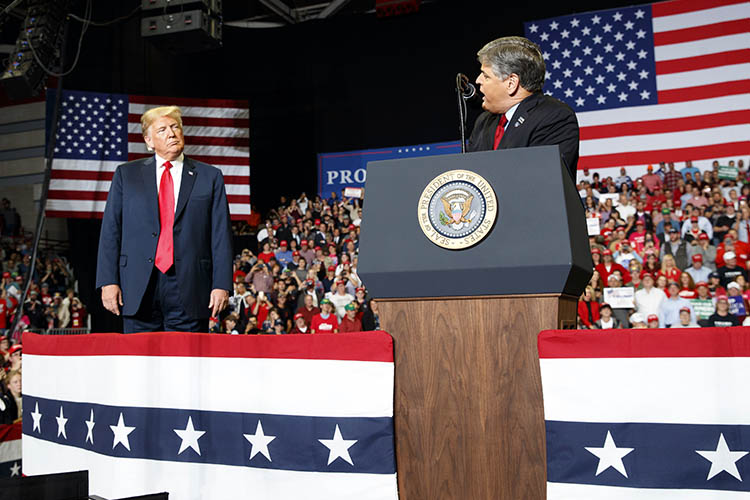Why is America’s government broken, a new paper asks
Evidence points to one clear culprit: Republicans
June 28, 2019

President Donald Trump listens to Fox News’ Sean Hannity speak during a rally in 2018. Both Trump and Hannity have played a role in the rightward shift of the Republican Party, according to a new article. (AP photo by Carolyn Kaster)
America’s political system isn’t working and there’s one clear culprit, according to a new article from a Berkeley political scientist: the contemporary Republican Party.
In the article, published in the July/August issue of Foreign Affairs, political science professor Paul Pierson and Jacob Hacker, a professor at Yale University, draw on years of research to write that an increasingly radicalized Republican Party is the “overriding culprit behind the failure of the U.S. political system.”
The Republican Party has “mutated” over the last 20 years from a traditionally conservative party that argued for limited government and traditional values into an “insurgent force that threatens the norms and institutions of American democracy.”

Paul Pierson is the John Gross Professor of Political Science at UC Berkeley. (Photo by Tracey Goldberg)
“You don’t see most conservative parties in other democracies being in the hands of climate change deniers or advocating such inegalitarian polices,” Pierson said in an interview, pointing to tax cuts for the rich and attempts to cut well-liked programs such as Medicare, Medicaid and Social Security.
President Donald Trump is both a symptom of this mutation and an accelerant of long-simmering changes in the party, Pierson said.
“It goes back to Newt Gingrich and the 1994 election, which rhetorically was built around the idea that the system is so corrupt that we have to tear it down,” Pierson said. “And over the years, there are a lot of things like this that are building, but obviously it takes a big leap in intensity with the election of Trump.”
Trump has launched attacks on the press, the courts, law enforcement and political opponents all “with virtually no pushback or even complaints from within” the Republican Party, Pierson and Hacker wrote, adding that these attacks aren’t an entirely new development but “a hastening of its march down an alarming path.”
Pierson said he and Hacker also examined the Democratic Party over the same period, and found that it had not shifted as dramatically to the left as the Republican Party had to the right, although both are closely watching the current Democratic primary.
“There are signs that the left is getting stronger within the Democratic Party,” Pierson said. “Yes, there’s Bernie Sanders and Elizabeth Warren. Even if one of them were to win, they would have to contend with much more moderate forces within the party and within Congress when they turned to governing.”
What happened?
Drawing on academic studies of polarization, Congressional and statehouse voting records, campaign contribution reports and media analysis, Pierson and Hacker, who co-wrote a 2010 book about income inequality, point to three main factors behind the party’s turn to insurgent politics.
The first is the power of grassroots organizing by far-right groups, whose focus is “economic policies that remove constraints on business and reduce taxes on corporations and the wealthy.”
They also argue that right-wing media has created an influential “outrage machine” that successfully discredits more mainstream media and encourages “confrontational, tribal” Republican politics.
The final contributor is an electoral system that gives unequal weight to Republican rural voters, who regularly elect majorities in the House, Senate and Electoral College with a minority of votes.
All these factors combine to create a system where the Republican Party is intent on stoking partisan conflict and destabilizing the system for its own political gain.
“Bias feeds on bias, allowing the GOP to flout majority sentiment while sustaining, or even expanding, its political power,” Pierson and Hacker wrote.
The trends hold even when Republicans are in power, and are exacerbated when they have a rally around a common focus, Pierson said.
“There’s a lot of evidence that these kinds of forces within the Republican Party become more powerful when they have a good target to aim at like (former presidents) Bill Clinton or Barack Obama,” Pierson said.
Data-driven conclusion
Pierson and Hacker first began wondering what was changing in the Republican Party in 2001, when Republicans passed tax cuts that favored corporations and the wealthy and not the core middle-class and working-class constituents of the Republican Party.
“We were struck by just how much they were targeted at the rich,” Pierson said. “As political scientists, we were a little perplexed by that because it didn’t seem like this was coming from voters at all.”
They found over years of research that the Republicans, as a party, have shifted dramatically away from the center, much more than Democrats have moved to the left.
“If you look comparatively at other countries, Democrats look like a very centrist, center-left party in the broader world of liberal democracies and Republicans have really moved toward the extreme right on a whole host of major issues,” Pierson said.
Pierson acknowledged that it may not be surprising that two professors from Berkeley and Yale would blame the Republican Party, but stressed all of their conclusions were backed by empirical evidence.
“We started looking at the fact that the Republican Party is pushing major legislation that polls terribly,” he said. “As a political scientists, we have to ask, ‘How can that be happening?’ What kind of evidence can we gather to explain why a party seems committed to advancing major public policies that are not supported at all by their voters?
“I try very hard to make sure that I’m following where the evidence leads,” he added.
Breaking the ‘doom loop’
So what can be done to re-center American politics and salvage the system of compromise the framers intended?
Pierson and Hacker offer two reasons for optimism.
First, serious issues like out-of-control medical costs and the threat of climate change can offer charismatic politicians a way to unite Americans around policy goals.
And second, an increasing number of (mostly Democratic) politicians are recognizing the need to reform the political system, including efforts to increase turnout, limit gerrymandering and curb the role of money in politics.
“There are powerful forces pushing for change,” Pierson and Hacker wrote.
Contact Will Kane at [email protected]